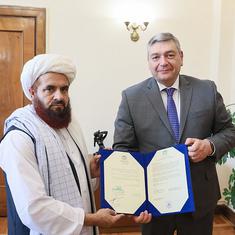Dilip Singh*, 29, a Havildar in the Indian Army, is posted at the Siachen Base Camp in Jammu and Kashmir, the highest and coldest militarised base in the world. In December, when Singh’s salary was credited to the joint bank account he shares with his wife, she had a tough time withdrawing money. It was only on her third visit to the bank that the homemaker could get some cash for household expenses.
On November 8, the Narendra Modi government scrapped Rs 500 and Rs 1,000 notes and imposed a slew of restrictions on withdrawal of money and exchange of old currency notes, resulting in a severe cash crunch. As a result, long lines outside banks and ATMs, which have rapidly been running out of cash, have been the order of the day.
Those who have complained about the resultant inconvenience have frequently been dismissed – on social media, in public discourse and in conversation – by citing the example of the soldier who stands for long hours at the border. But Singh said that when it comes to matters concerning his home, “we [people in the Army] are civilians too”.
If waiting in queue is serving nation like soldier.So dying in queue must be termed as sacrificing life while servingCountry.#DeMonetisation
— Ashish Agrawal (@ashishpeace) December 20, 2016
"Soldier" - key word that helps end all rational thinking and enables you to win any argument. #DeMonetisation #DeMonetisationDisaster
— Caralisa Monteiro (@runcaralisarun) December 11, 2016
Earlier this month, the photograph of a retired soldier breaking down after losing his spot in a bank queue in Gurgaon, taken by a Hindustan Times photographer, went viral. Nand Lal, 78, had reportedly been trying to access his pension for three days.
The sad face of #DeMonetisation is a retired Armyman. Where are those shouting soldier soldier... https://t.co/Zd49Y5Sngk
— Deeptiman Tiwary (@DeeptimanTY) December 16, 2016
Before that, in November-end, a Facebook post by retired Army man Darshan Dhillon, who had been told off for complaining while queuing up outside an ATM, was widely shared.
On the front
Scroll.in spoke to soldiers posted in Jammu and Kashmir, Maharashtra, Uttar Pradesh, Rajasthan and Himachal Pradesh, some of them on the border. Most of them said that they were not significantly inconvenienced as they did not need much cash for their day-to-day transactions while at their posts. But their families back home had suffered in different ways – from having to cut down on their monthly expenses to spending hours in queues outside banks and ATMs only to return home empty-handed as cash would run out.
In October, Havildar Pawan Kumar* was relieved from his posting in Siachen and transferred to Maharashtra. Kumar transfers money to his brother’s bank account or gives cash to his wife, who lives with his family at in East Delhi, when he visits. Days before leaving for his new posting in the first week of November, Kumar gave his wife Rs 39,000 in cash. Two days after he reported for duty, he learnt that most of that money was now worthless.
“Almost Rs 35,000-Rs 36,000 were in old Rs 500 and Rs 1,000 notes which were no longer valid,” said Kumar. “While my wife managed to get Rs 8,000 exchanged [the daily exchange limit is Rs 4,500], the remaining had to be deposited. But the next challenge was withdrawal. My son’s school fees had to be paid and they [school authorities] asked for cash. For necessities, my family starting taking credit from a local shop and, meanwhile, they broke the piggy bank that had several Rs 100 notes apart from smaller denominations.”
Naik Rajeev, posted in Himachal Pradesh said that his family, also in the state, had suffered initially, but the situation was fine now. “When I went home, I saw that many shops in the main market have got card swipe machines,” he said. “My family suffered a cash crisis which was more intense in November and the first week of December but things have become quite normal now. I believe we can bear this much if it is for the interest of the nation.”
Naik Yogendra*, posted in Uttar Pradesh, hopes the situation will ease by January, when he plans to visit his hometown in Haryana. After the November 8 announcement, his wife deposited around Rs 13,000 their joint bank account, but withdrawal turned out to be a problem for his family too. “Thankfully, my son’s school accepted cheque, but groceries and other essential commodities had to be purchased [with cash],” he said. “Such procurements were done on credit, which I shall pay off on reaching home.”
Mahender, posted as a Naik in Rajasthan, complained about lack of cash at bank branches in his village in Haryana. “I had Rs 3,000 in old notes, which I got exchanged myself, but my family had to withdraw money for daily expenses and my wife failed to get cash despite being in bank queues twice.”
Referring to the arrest of bank officials in an alleged money-laundering case earlier this month, he said: “Had these bank officials not been involved in helping those with black money, things would not be so difficult for the general public.”
*The names of these soldiers have been changed to protect their identities.










